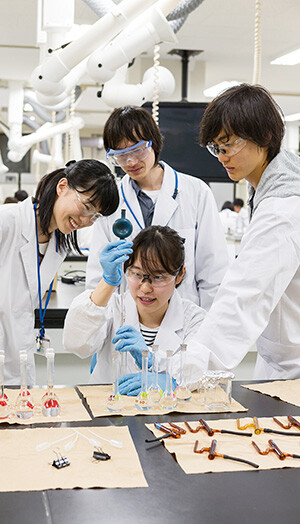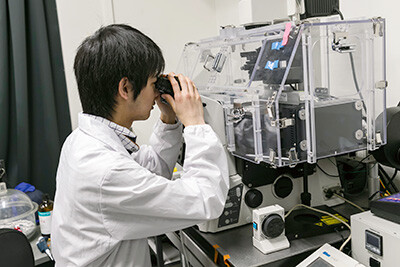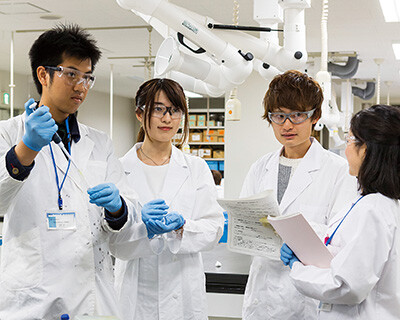Faculty of PHARMACEUTICAL SCIENCES
Contribution to medical care and society through innovative drug discovery and improvement
Develops pharmaceutical sciences through the synthesis and application of integrating scientific research studies

Pharmaceutical sciences are multi-disciplinary studies for the discovery, manufacturing, and use of pharmaceutical products that cure diseases and enhance health. Physics, chemistry, and biology form its scientific foundation. The Faculty of Pharmaceutical Sciences, Kyoto University, offers students opportunities to thoroughly learn the basic sciences. It integrates and applies the findings from scientific studies and provides more advanced pharmaceutical education and research.
Develops consciousness of social responsibility and morality
The recent advances in medical technology and advent of the aging society have increased the social importance of pharmaceutical sciences. Research and development and appropriate use of pharmaceuticals are closely related to human health and life. Because of the social implications of the discipline, our education and guidance place great emphasis on providing students opportunities to understand the scientific backgrounds essential for the academics involved in pharmacology and cultivate their consciousness about social responsibility and morality.
Nurtures drug discovery scientists and medical pharmacy researchers/pharmacists
The Faculty of Pharmaceutical Sciences, Kyoto University, includes two divisions: the Division of Pharmaceutical Sciences (4-year program), which aims to nurture scientists and engineers in the drug discovery sciences; and the Division of Pharmacy (6-year program) dedicated to producing pharmacists and medical pharmacy researchers and technicians. The students are assigned to one of the two programs according to their intentions and academic standings when they are enrolled in the fourth-year course.
The Faculty provides the following curricula for undergraduates.
●The curricula of Years 1 and 2 include all-faculty common subjects, primarily comprised of liberal arts subjects including foreign languages in addition to fundamental subjects for specialized knowledge. The curricula are intended to encourage students to acquire a high-level knowledge of cultural backgrounds and scientific ways of thinking by accessing a wide range of disciplines. They also seek to develop basic skills and thinking required for learning more specialized subjects. Students are required to take fundamental subjects for specialized knowledge, including An Introduction to Pharmaceutical Sciences, An Introduction to Health and Life, Fundamental Physical Chemistry for Pharmaceutical Sciences, and Basic Organic Chemistry. Year 2 students are required to take all-faculty common subjects, lectures, and exercises for Fundamental Scientific Communication, one of the fundamental subjects for specialized knowledge. In addition, they are also required to take some specialized subjects in pharmaceutical sciences.
●The Year 3 curriculum is based on specialized subjects for acquiring expertise in pharmacology and experimental techniques. Students are required to take some research basics subjects in order to acquire a high level of expertise, which will assist them in their graduate school education. In addition, all specialized practical training courses are compulsory for acquiring experimental techniques related to all specialized areas of pharmacology.
●The Year 4 curriculum of Division of Pharmaceutical Sciences primarily includes special laboratory training, which covers most of that year. For this training, students enroll in one of the laboratories and work on a specific specialized study area, with academic staff providing guidance and advice. Special laboratory training is also important in that the students acquire a general idea about drug discovery research and because the experiences provide them opportunities to think about their future career paths as researchers.
●Years 4, 5, and 6 (Division of Pharmacy): In the first semester of Year 4, lectures are conducted before noon, and medical pharmacy workshops are held in the afternoon. The objective here is to ensure that students acquire a holistic idea about medical pharmacy. Special laboratory training begins in the second semester of Year 4 and continues through to Year 6. Students are enrolled in one of the laboratories to attend the special laboratory training and work on a specific specialized study area, with guidance and advice provided by academics in the laboratory. Through the process, students form a general idea about medical pharmacy and begin to think about their future career paths as medical pharmacy researchers/pharmacists. In Year 5, a five-month practical training course is provided at the Department of Pharmacy of Kyoto University Hospital and at off-campus dispensing pharmacies to help students understand the functions and responsibilities as pharmacists in medical institutions and learn pharmacist practices on the job.
*You cannot enter the Division of Pharmacy through Kyoto iUP.
Curricula, Study Programs in Divisions and Laboratories
Division of Pharmaceutical Sciences <4-year program>
Focuses on producing drug discovery sciences researchers and technicians

The curriculum of the Division of Pharmaceutical Sciences is designed to equip students to work on questions related to the design and synthesis of pharmaceutical agents and their interactions with biomolecules. It also offers opportunities for students to acquire knowledge and develop technical skills related to the basics and application of drug discovery sciences, integrated knowledge body about structure, functions, effects, and kinetics field of pharmaceutical agents. In Year 4, students enroll in preferred laboratories and work on special laboratory training, which provides them access to the most advanced drug discovery sciences. The objective of the overall education program is to nurture researchers and technicians trained in drug discovery sciences. Many graduates proceed to the graduate school (2-year master course, 3-year doctoral course, and 5-year integrated doctoral course) in order to deepen their expertise from a broader perspective and to develop their research capabilities, which is one of the prominent characteristics of the division.
Division of Pharmacy <6-year program>
Focuses on producing medical pharmacy researchers and pharmacists who can usefully work in advanced medical care settings

Pharmacy is an integrated knowledge body intended to ensure appropriate use of pharmaceutical agents. Students of the Division of Pharmacy learn the knowledge and technical skills related to the basics and application of the discipline through clinical practices. Special laboratory training, hospital internship, and pharmacy internship are provided in Years 4 through 6. The objective of the Division of Pharmacy is to nurture medical pharmacy researchers and technicians and pharmacists who can usefully work in advanced medical care settings. The students are eligible to take the national examination for pharmacists once they graduate from the Faculty. Those students who wish to deepen their expertise from a broader perspective and develop their research capabilities can proceed to the graduate school (4-year doctoral course).
*You cannot enter the Division of Pharmacy through Kyoto iUP.








